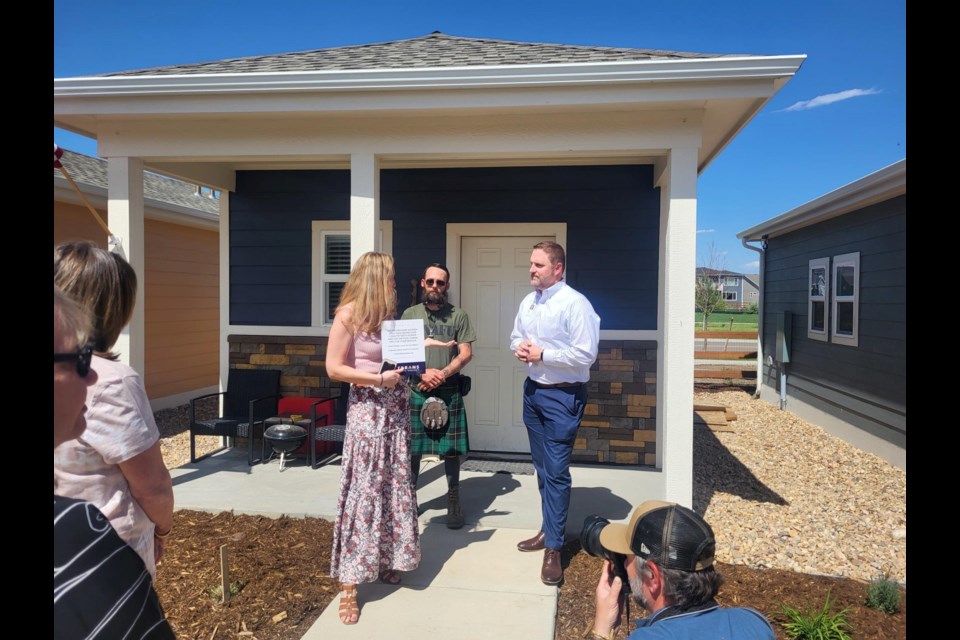The Veterans Community Project (VCP) held a plaque dedication ceremony on May 12 to commemorate the completion of one of the tiny homes in its Longmont village. The construction of the home, now occupied by a local veteran, was made possible by a $50,000 grant from the Longmont United Hospital Foundation, which also helped VCP complete its capital campaign for the village’s construction.
For the veteran now living in the home, the donation was particularly meaningful. “Longmont United Hospital has really helped me when I needed it, so it's pretty cool that my home is their sponsored home,” he said. Beyond the physical structure, he also spoke about the sense of community he found through VCP. “This place has been a blessing in disguise. This is the best group of veterans I've been around,” he said.
Josh Atherton, executive director of the Longmont United Hospital Foundation, explained that the foundation often focuses on filling gaps where traditional healthcare funding cannot reach. “We look for opportunities where the hospital or CommonSpirit as a whole can’t fund things,” Atherton said. “We try to fill those gaps. This is one of those projects that really fits within our health and wellness focus.”
Atherton also noted that VCP’s dedication to holistically supporting veterans' physical and mental health needs made a strong impression on the foundation's board. “What our board loved about it is that the Veterans Community Project is working to lift up veterans,” he said. “They’re giving them a safe place to stay, along with the opportunity and resources to get back on their feet and focus on sustainable living.”
In addition to housing, VCP connects veterans with services that promote long-term self-sufficiency. Many residents of the village also receive medical and mental health care through Longmont United Hospital. “A lot of these veterans come to our hospital, meet with our doctors and our physicians, and get services,” Atherton said.
VCP Executive Director Jennifer Seybold emphasized that the project's impact goes beyond simply providing shelter. “It’s not just about building homes,” she said. “It’s about creating a stable, dignified space where veterans can heal and rebuild. For many of them, mental health challenges are tied to the instability of homelessness, and by providing a safe space, we give them a foundation to address their emotional and psychological needs.”
While VCP does not offer clinical mental health services, it partners with local organizations to support residents in their healing journey. “A lot of our veterans struggle with mental health, and we partner with local organizations to provide the clinical care they need,” Seybold said. “But the non-clinical support is just as critical. Having a home, access to food, and a community to belong to are key to their mental health recovery. We want them to feel connected, not isolated.”
Research supports this holistic approach. A 2021 report from the U.S. Department of Veterans Affairs found that regular social connection, what the agency calls “meaningful contact,” can significantly reduce the risk of suicide among veterans. “Even just one touchpoint a week can make a huge difference in someone’s mental health,” Seybold noted. “Creating a sense of belonging and connection helps to combat the isolation many of these veterans feel.”
Atherton referred to the project as a reflection of Longmont’s collaborative spirit. “Longmont has always been about supporting each other,” he said. “This project shows our city’s commitment to helping those most in need.”
Looking ahead, the Longmont United Hospital Foundation plans to continue investing in initiatives like VCP that foster community well-being. “It’s a small part of our focus, but it’s one that we’re really proud of,” Atherton said.
To honor the completion of all 26 homes in the village, VCP will host a housewarming event on June 12 for residents, partners, and community members.



